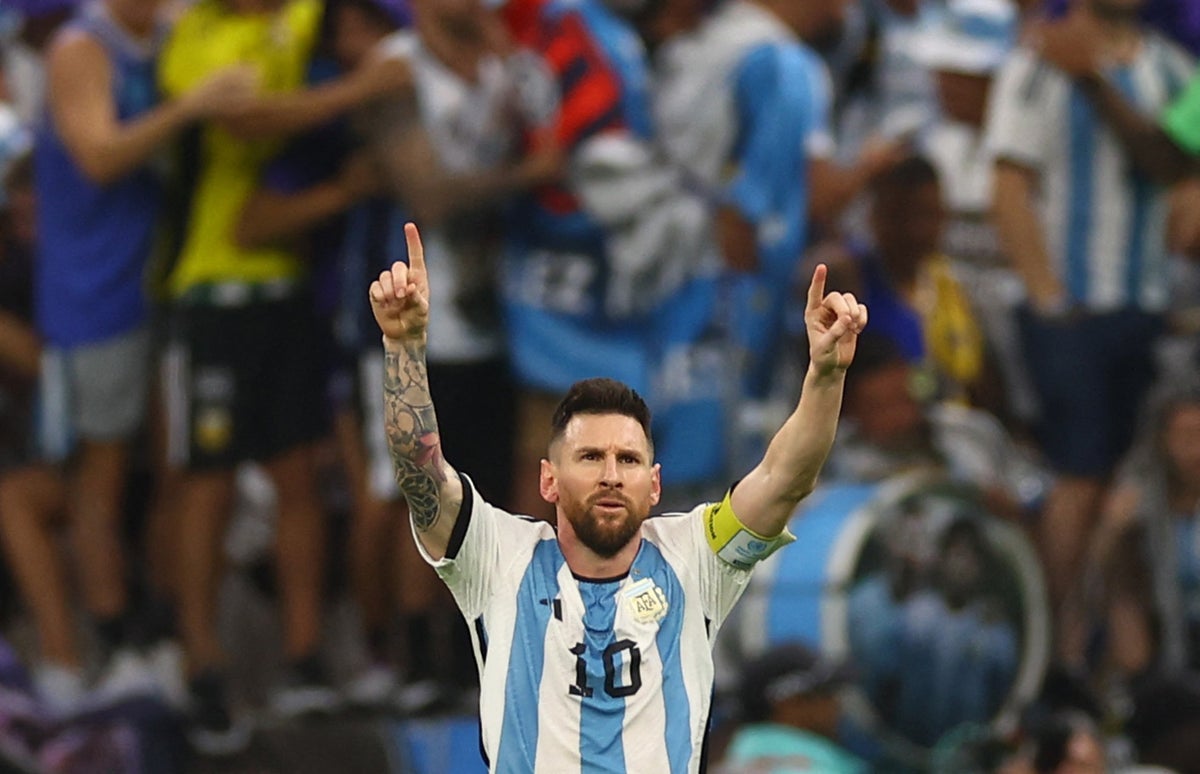
As Lionel Messi starts to find the right words to go with the right touches, some of them surprisingly aggressive, there’s been a telling phrase used to describe him around the Argentina camp.
They talk of the 35-year-old as a “líder Maradonina”, a Maradona-like leader.
After his first major moment of the World Cup 2022, which was that essential and exceptional goal against Mexico, Messi was seen looking to the sky and mouthing “gracias Diego”. His teammates now speak of the “spirit of Diego”, and the 35-year-old is also being described as a “man possessed”.
While Argentine football can be overly invested in the emotion and influence of the metaphysical – one player has instructed the friend of an agent to stay because his arrival “brought good luck” – there are very real acts and effects to this. It could be seen in the aftermath of the quarter-final. The Netherlands’ Wout Weghorst had come over to try and swap shirts but Messi was still in battle mode, offering that now famous line as he broke from an interview. He was still consumed by the intensity of the contest.
The Argentine players meanwhile talk of a captain who is leading by example in every sense, so loudly encouraging them, giving team speeches. The various football figures that form the extended entourage have at the same time noted they’ve seen this before, and that it’s “like 1986”.
The problem for Argentina in this game is that, for Croatia, there is the spirit of 1998 and 2018. There isn’t really the playing quality of those campaigns, it should be said, but that’s only bolstered the will of the squad.
Croatia know they would have been out at the group stage had Romelu Lukaku taken even one of his many chances in that last group game. They have barely been in the lead themselves over the course of this tournament, with that time adding up to just 46 minutes. That is something else similar to 2018 but in this case, it has fostered a driving belief similar to one of the other semi-finalists.
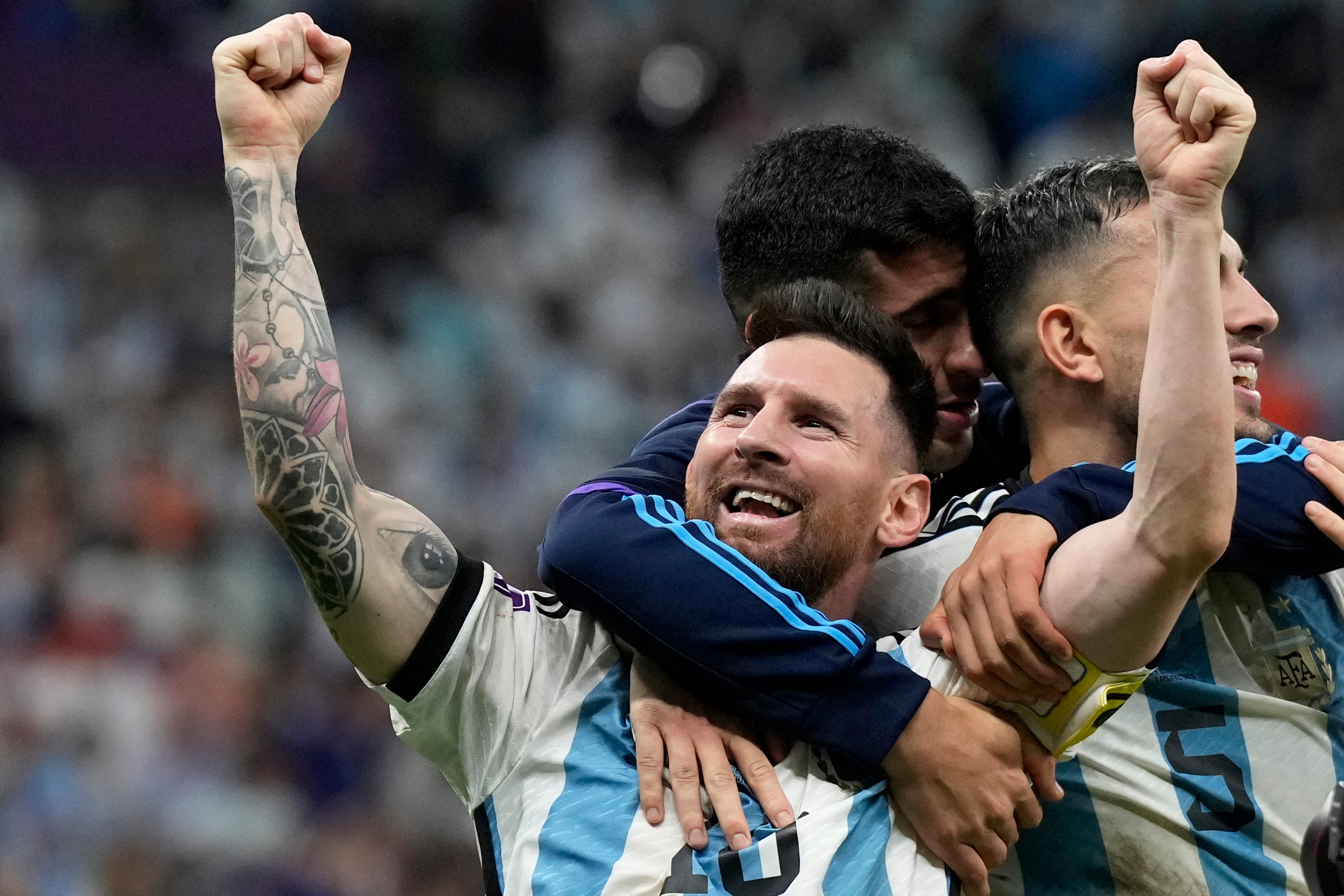
Just as an aura has grown around Morocco that no one can score against them, there is a feeling that Croatia simply can’t be beaten. No matter how you go at them, no matter if you take the lead, they just keep coming. They find a way. This is something that has been said about another Luka Modric team this year in Real Madrid, and that really doesn’t feel like a coincidence.
It makes this a contest between two teams driven by that classic tournament emotional momentum, where something bigger takes over and takes them a very long way. It is far more relevant than the fact they met in 2018, other than how there is such surprise that Croatia have been able to pick up where they left off in Moscow as World Cup revelations.
That is something that looks like it could be unique in the competition’s history. It is very rare that surprise finalists go again.
Whether they can go that far again – and have another match that manager Zlatko Dalic would describe as one of the greatest in their history – depends on this, and how their opponents respond.
Because, if Croatia’s World Cup run has been completely characterised by a refusal to lose, Argentina’s has been framed by a huge defeat. Everyone around the squad now says that the shock against Saudi Arabia was “the best thing that could have happened”. Jorge Valdano, Argentina football’s philosopher-poet, of course put it best.
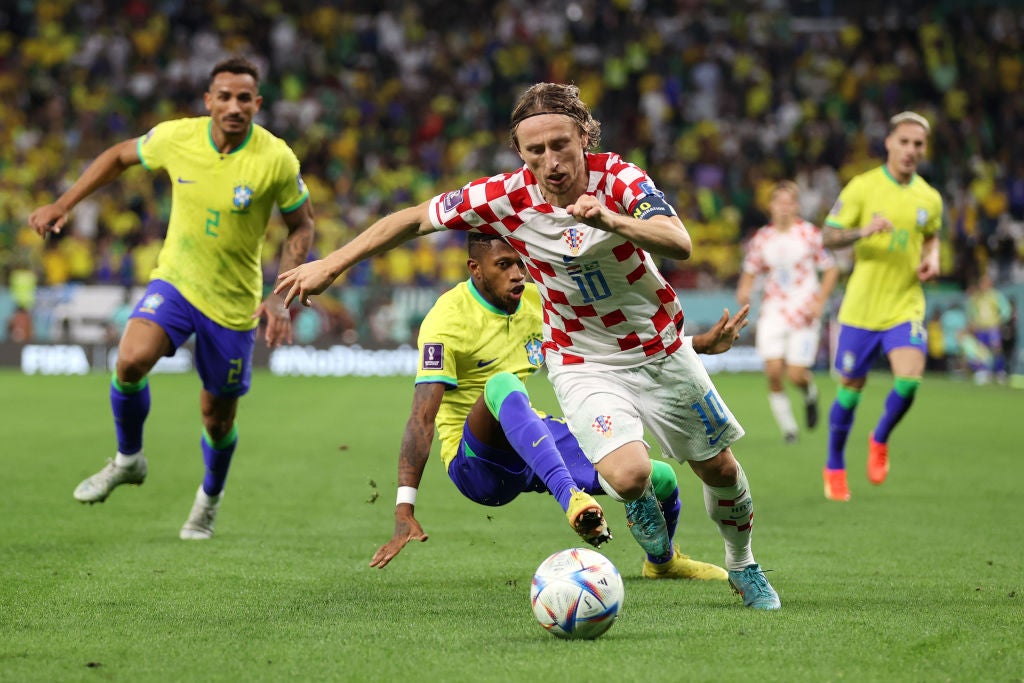
“Argentina’s advantage is that first traumatic loss created a vicious circle but also a virtuous cycle: it obliges change, forces you to overcome, makes you stronger.”
That has been seen in every game since. Valdano even noted how it was a fear for Brazil that they were “too happy for football, which tends to hide around the corner and stab you when you least expect”.
Argentina instead play as if they always expect danger, in keeping with how they have had to treat every game since Saudi Arabia as “a final”. That can bring panic, as witnessed in so many hacked clearances, but also conviction. Argentina keep getting through. The Dutch game spoke to their flaws but also their perseverance in overcoming them.
It would have been very easy for Argentina to give in twice. There was first how they lost that 2-0 lead in the very last minute. There was then how they were forced to penalties despite bombarding the Dutch goal in the entire second period of extra time. Everyone was well aware of the idea that the team who feel more fortunate to get to penalties generally win. Argentina overcame that as well as so much else, Messi setting the tone with his speech in the huddle and then his rousing of the fans after scoring his cool opening penalty. The shootout did become a psychological thriller in the way that has been talked of so commonly but is occasionally overstated. Not this time.
The reaction – especially in the face of Dutch provocation – also reflected this defiance, this willingness to fight.
That has been important. In recent tournaments, Argentina have been all too aware of this suffocating pressure to achieve. They have spoken about how it has “frozen” them. That has been banished in Qatar, however, by two stark realisations. One was the immediacy of their situation after the Saudi Arabia defeat, which meant they had to win all six remaining games to win this World Cup. The second was that this could be Messi’s last World Cup. It is why his own rise as a leader has brought it all together. There is a common desire and a feeling of opportunity. The squad say there is now little of the “negative pressure” of before. It is all about what might be next.
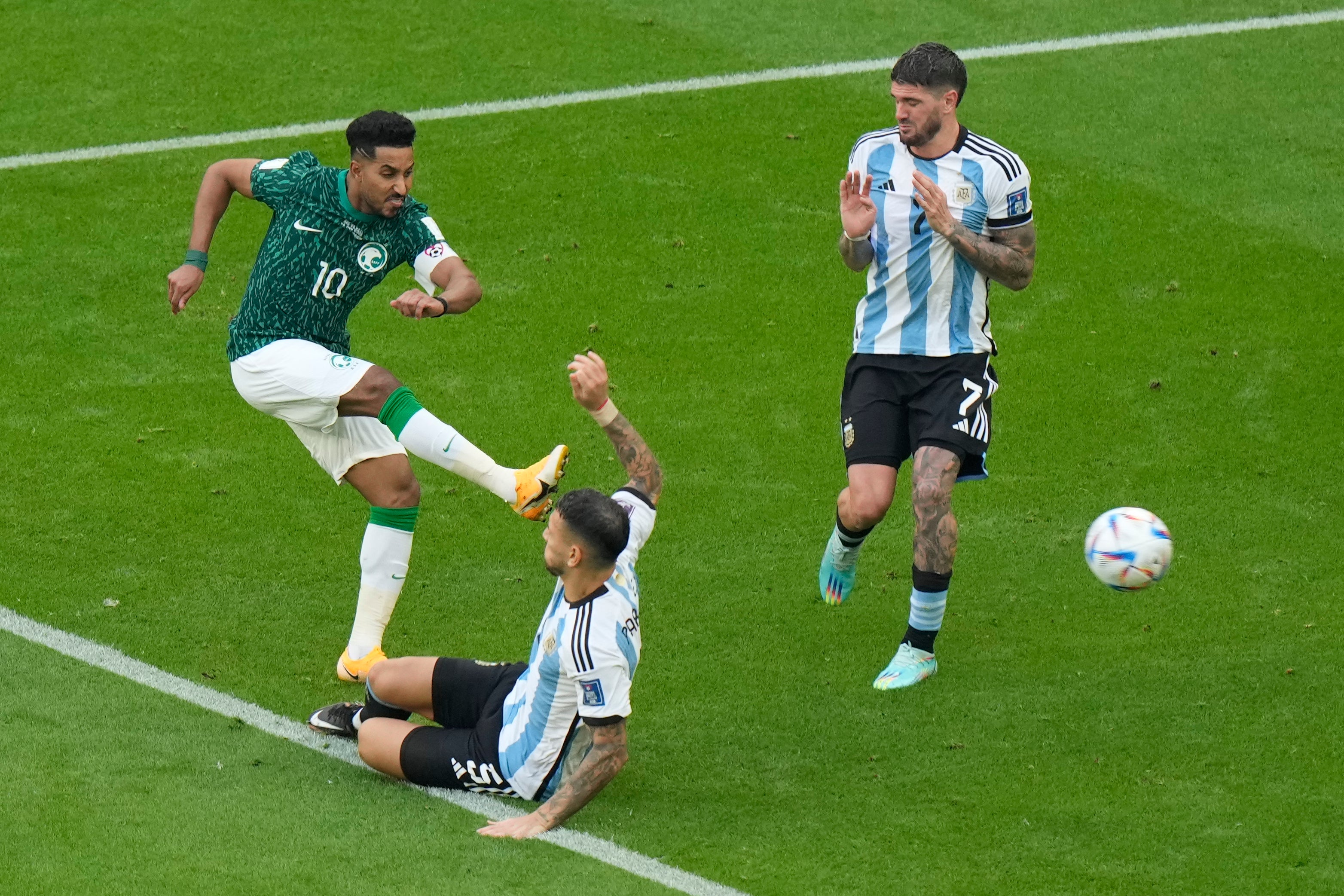
They also talk of other elements coming together. If this is not a perfect Argentine squad in terms of positions or quality, it is in terms of chemistry. They feel there is just the right mix between veterans and young players. No one is unhappy about not playing, as Lionel Scaloni has kept everyone involved.
To go with a similar will, there is a similar blend in the Croatian squad. They have some stars, elevating everything, but also some underappreciated players driving everything. If Croatia have defied all expectation to get this far, so have many of their players.
As journalist Juraj Vrdoljak says, so many of these players “have a story of making it despite some heavy doubts”. Josip Juranovic had to go from third-division football as a defensive midfielder to a free back-up player to the right-back at Hajduk Split and was dismissed as a limited player. Mario Pasalic was sent away by Chelsea on various loans before suddenly finding his way in Italian football with Atalanta. Bruno Petkovic, the scorer against Brazil, could not score at all over two years in Italy with Bologna and Hellas Verona before returning to Croatia as a substitute for Dinamo Zagreb. Mislav Orsic was a journeyman around Slovenia, South Korea and China. Even Dejan Lovren has been dismissed as a bit of a joke player.
And yet here they are, complementing genuine world-class talents like Modric, Mateo Kovacic and Josko Gvardiol, and again on the brink of the grandest and most cherished occasion in all of sport. This team, like these players, just keep going.
Whether they can go further will depend on what Argentina do. The intrigue of this game is that Dalic has ensured Scaloni has more to think about.
Croatia are currently working on ways to mitigate Messi’s influence but they know how they’ll set up. The need to constantly have a guard of four players around him fits well with their midfield, meaning they could outnumber Argentina in the centre of the pitch.
Scaloni has to work around that, or through it. He has to change his shape to have more players in the middle, meaning Leandro Paredes will likely come back in.
The positive for Argentina is that Scaloni is now adept at switching formations. They are adaptable. There have even been games in this World Cup where he has tried something new in training on the eve of a game, only to switch to something else for the match itself.
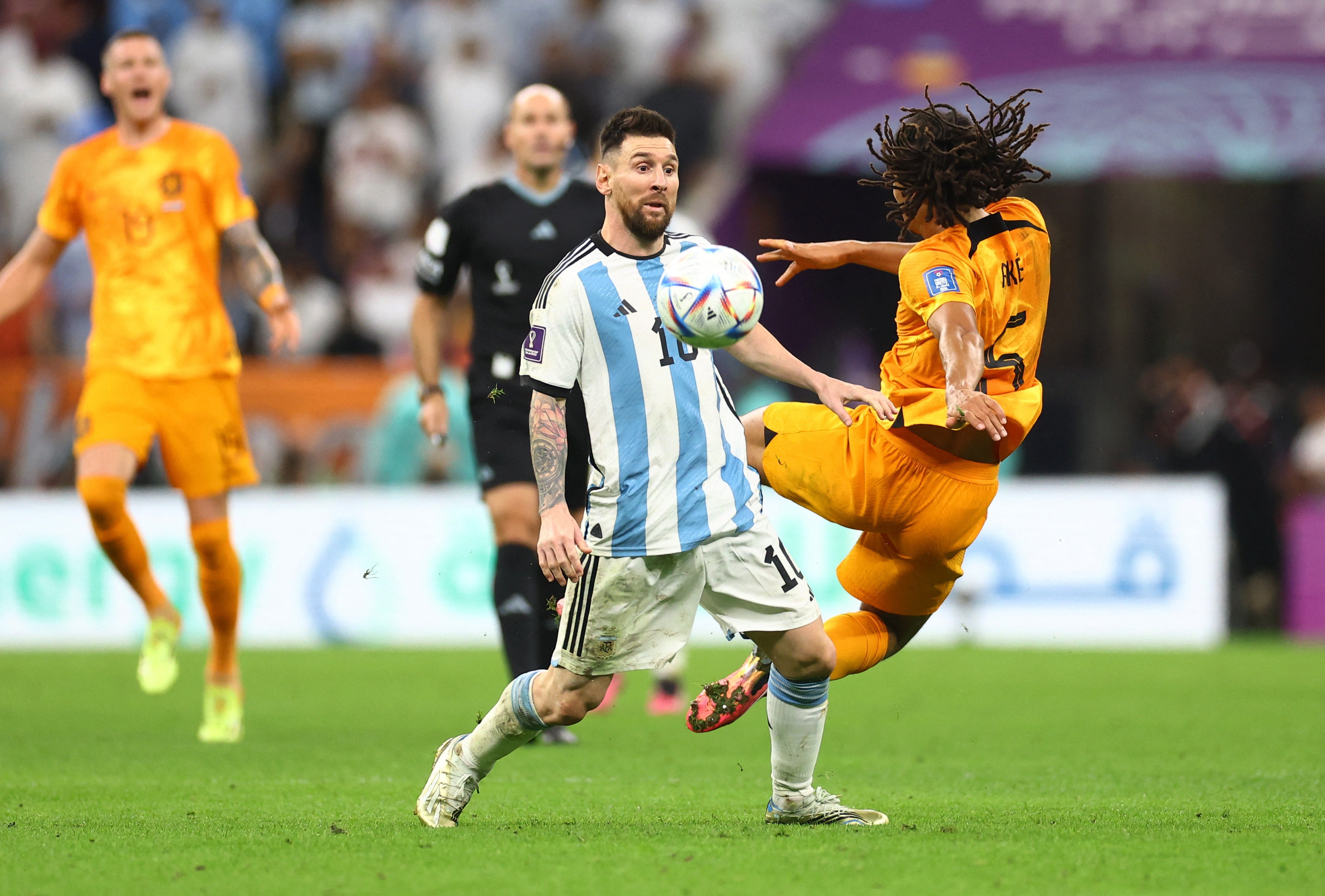
If that has the potential to cause problems at some point, it also shows how comfortable the players are with his approach.
Such considerations will greatly condition this semi-final but it does not feel like they will decide it. We’re at a point where more intangible elements have an undue effect.
It has been the story of their surges, after all, to the stage at the Lusail where so many points meet.
It is one historic player possessed against a group of cast-offs no one wanted. It is a team that won’t be defeated against a team driven by defeat.
It’s going to be about the will, as this World Cup has already shown so often. It's something that's gone beyond words.







